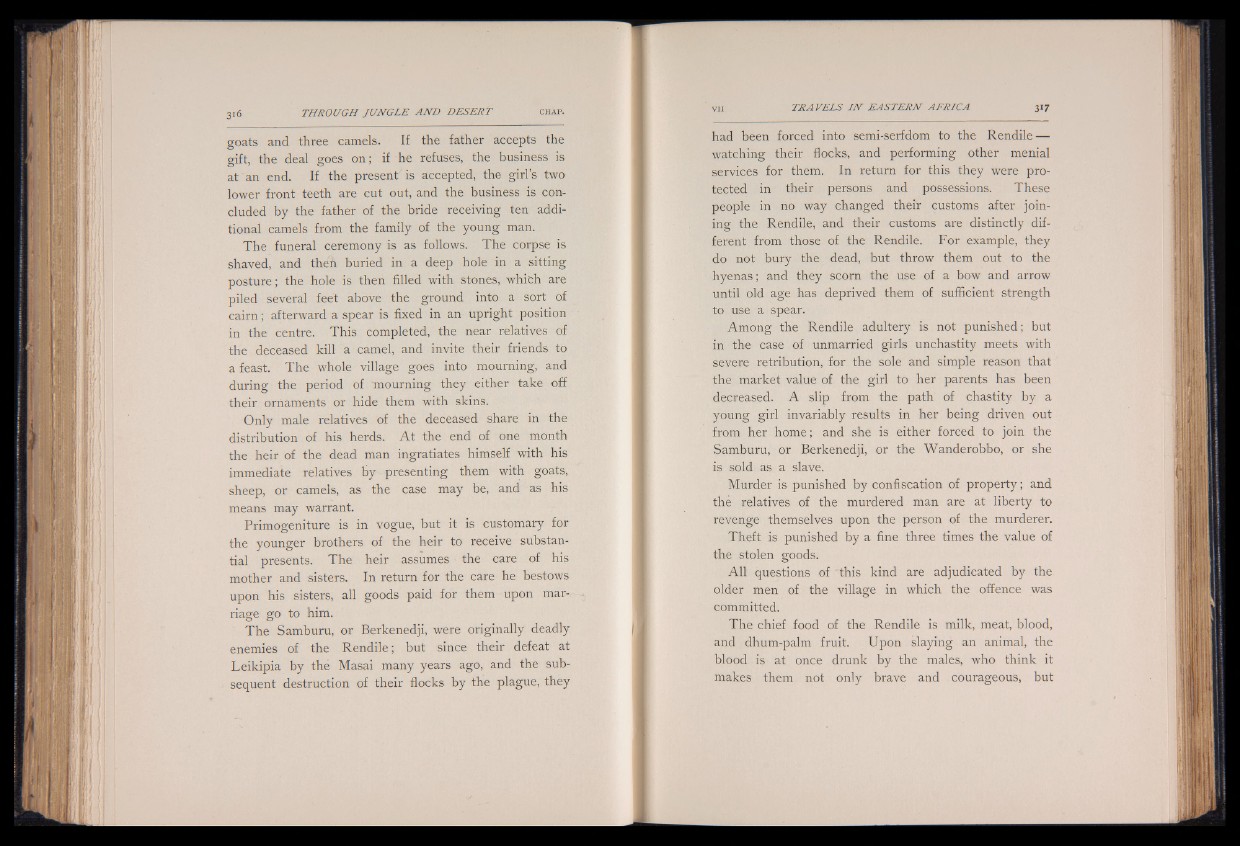
goats and three camels. If the father accepts the
gift, the deal goes o n ; if o ' o he refuses, the business is
at an end. If the present is accepted, the girl’s two
lower front teeth are cut out, and the business is concluded
by the father of the bride receiving ten additional
camels from the family of the young man.
The funeral ceremony is as follows. The corpse is
shaved, and theh buried in a deep hole in a sitting
posture; the hole is then filled with stones, which are
piled several feet above the ground into a sort of
cairn; afterward a spear is fixed in an upright position
in the centre. This completed, the near relatives of
the deceased kill a camel, and invite their friends to
a feast. The whole village goes into mourning, and
during the period of mourning they either take off
their ornaments or hide them with skins.
Only male relatives of the deceased share in the
distribution of his herds. A t the end of one month
the heir of the dead man ingratiates himself with his
immediate relatives by presenting them with goats,
sheep, or camels, as the case may be, and as his
means may warrant.
Primogeniture is in vogue, but it is customary for
the younger brothers of the heir to receive substantial
presents. The heir assumes the care of his
mother and sisters. In return for the care he bestows
upon his sisters, all goods paid for them upon marriage
go to him.
The Samburu, or Berkenedji, were originally deadly
enemies of the Rendile; but since their defeat at
Leikipia by the Masai many years ago, and the subsequent
destruction of their flocks by the plague, they
had been forced into semi-serfdom to the Rendile —
watching their flocks, and performing other menial
services for them. In return for this they were protected
in their persons and possessions. These
people in no way changed their customs after joining
the Rendile, and their customs are distinctly different
from those of the Rendile. For example, they
do not bury the dead, but throw them out to the
hyenas; and they scorn the use of a bow and arrow
until old age has deprived them of sufficient strength
to use a spear.
Among the Rendile adultery is not punished; but
in the case of unmarried girls unchastity meets with
severe retribution, for the sole and simple reason that
the market value of the girl to her parents has been
decreased. A slip from the path of chastity by a
young girl invariably results in her being driven out
from her home; and she is either forced to join the
Samburu, or Berkenedji, or the Wanderobbo, or she
is sold as a slave.
Murder is punished by confiscation of property; and
the relatives of the murdered man are at liberty to
revenge themselves upon the person of the murderer.
Theft is punished by a fine three times the value of
the stolen goods.
All questions of this kind are adjudicated by the
older men of the village in which the offence was
committed.
The chief food of the Rendile is milk, meat, blood,
and dhum-palm fruit. Upon slaying an animal, the
blood is at once drunk by the males, who think it
makes them not only brave and courageous, but